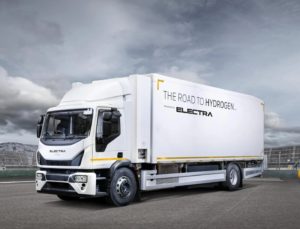
With many companies and countries looking to accelerate the transition away from fossil fuels to reach global climate goals, the clean fuel could, with the right infrastructure in place, provide a user friendly option.
The associated production assets and infrastructure required also present opportunities for a major economic growth.
Element 2, the hydrogen refuelling business, recently announced a partnership with Tower Group to establish hydrogen hubs for trucks at three key locations in Devon and Cornwall.
The hydrogen hubs will have the capacity for long-term energy storage and Element 2 will provide refuelling systems for the Tower Group-produced hydrogen.
Tower Group’s hydrogen hub plans include sites along critical M5 motorway and A30 trunk roads connecting the South West with London.
Element 2 will also provide Tower Group with technical and logistical support in relation to establishing its hydrogen refuelling solutions, as well as collaborating to identify potential fleet customers for the hydrogen stored at its facilities.
Alex King, Chief Executive officer, Tower Group, said, “Hydrogen will play a central role in the decarbonisation of a range of industries in the South West, including road transport.
“Our hydrogen hubs will have the capacity to store significant volumes of hydrogen, and working with partners like Element 2, we will be able to ensure a regular and reliable supply of hydrogen to customers.”
Electra Commercial Vehicles recently announced the successful completion of a three-month trial supporting major UK supermarket Sainsbury’s with its zero-emissions 19-tonne refrigerated hydrogen-powered truck.
The Electra eCargo Fuel Cell Electric Vehicle (FCEV) travelled a typical daily journey of 208 miles from the supermarket’s depot in Sherburn-on-Elmet to Newcastle and back – emitting zero emissions versus an average of 314kg of CO2 emitted per day by a diesel truck making the same trip.
Data collected from the trial also showed that the HGV used approximately 65% of its hydrogen capacity per trip, giving it an approximate operational daily range of 320 miles on one fill of hydrogen.
The Electra eCargo FCEV has been in operation with Sainsbury’s in the Tees Valley area and beyond as part of the Road to Hydrogen – a UK Government-funded project.
This focuses on helping the UK solve challenges around zero-emission road freight linked to the Teesside Multi-Modal Transport Hydrogen Hub.
Tim Harper, Chief Executive Officer at Element 2, which provided the hydrogen and refuelling infrastructure for the trial, said: “The completion of this trial represents a major milestone in the road to decarbonising UK road transport.
“Electra’s truck has demonstrated how hydrogen can provide a viable alternative to diesel for fleet owners and operators – and in particular for heavy goods haulage due to its superior range capabilities.”

The filling station, which is expected to be on stream in spring 2023, will make an additional 1.5 tonnes of fuel-cell-grade hydrogen available daily to serve the transport and energy transition market, with capacity to serve a fleet of 100 buses or 50 trucks.
Air Products also recently announced plans to bring the first large-scale, green hydrogen production facility to the Port of Immingham, together with Associated British Ports.
Manish Patel, UK Hydrogen for Mobility Director at Air Products said: “Air Products has made an industry-leading commitment of at least £12.2 billion to clean energy transition megaprojects to ensure when governments or industries want to make the switch to clean hydrogen, they will know they have a reliable and secure supply.
“With a hydrogen pathway for Wales under development, it’s an exciting time to be investing in South Wales and we hope that our investment will give real impetus and momentum to the wider green economy in the region.”
Meanwhile, ScottishPower, with Hutchison Ports, is exploring the opportunity to develop, build and operate a green hydrogen production facility at the Port of Felixstowe which could provide clean fuel for road transport customers there.
The project aims to continue engineering and site development works to align with customer demand from 2025 onwards.
Barry Carruthers, Hydrogen Director at ScottishPower said the strategically important project could potentially create a clean fuels hub that could unlock nationally significant decarbonisation for the region.
“It’s perfectly located not far from our existing and future offshore windfarms in the East Anglia region, and demonstrates how renewable electricity and green hydrogen can now start to help to decarbonise road, rail, shipping and industry”, he added.
In addition, Hydrogen provider Protium is working with Kier Highways to conduct a feasibility study examining if its highways depots can be powered using green hydrogen.
Key to Kier Highways achieving its net zero targets is via its fleet, which contributes to the majority of its scope one and two emissions.
The study will look at the environmental, technical and financial benefits of using hydrogen and fuel cell technologies, and how this can help Kier Highways achieve its target of being net-zero on its scope one and two – operational emissions – by 2030.
It is due to be completed in summer 2023 and will aim to create a blueprint for future net-zero depots, including heating and lighting, but with a focus on HGVs, such as gritters.
Matt Tompsett, Head of Environment and Sustainability at Kier Highways, said the business has an ambition to electrify its small fleet, while focusing on hydrogen for HGVs.
He added: “We will need a mix of renewable green fuels to achieve net zero and deliver our services in the future.

Large scale hydrogen production could be a safe, long-term energy solution and a vital tool for companies looking to decarbonise their operations and help them reach net zero targets.








